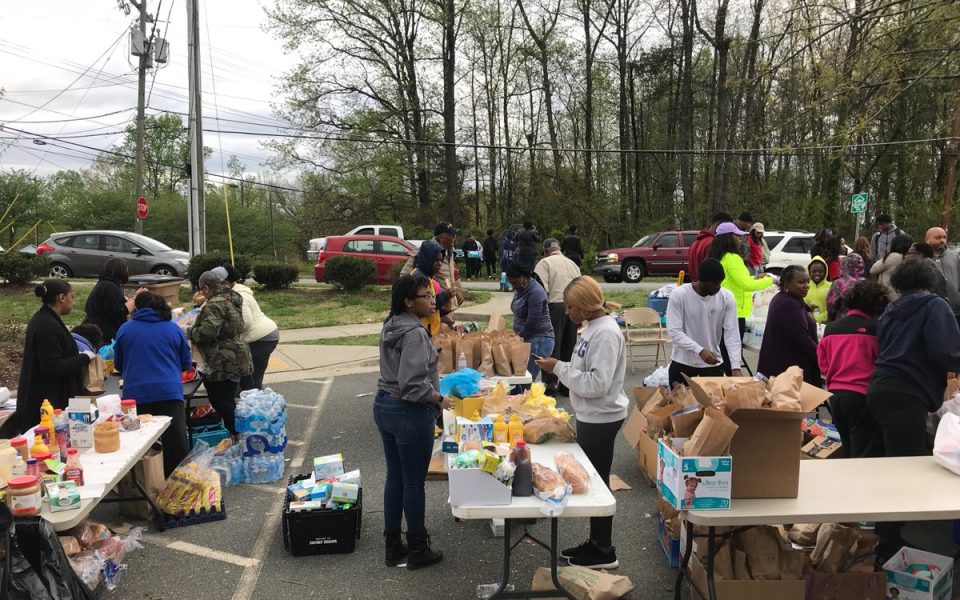As the first fat drops fell on Sunday afternoon I persisted under the illusion that I could finish my backyard project — a compost bin made out of salvaged lumber — and cursed when my drill bit got stuck in a board.
Then the skies opened and dumped a deluge of rainfall in blinding sheets. I dashed around grabbing tools, and then stripped off my soaking clothes to get in the shower. But before I had a chance to get in the hot water I heard a loud, rapid tapping, and was horrified to discover water seeping in through the fireplace.
As unsettling and disruptive as the storm felt on the west side of Greensboro, I couldn’t have imagined that at roughly the same time a tornado was blasting the bay window out of my aunt and uncle’s house in the southeast corner of the city near Barber Park as they and their two boys huddled in the bathroom.
The storm touched down near Barber Park and carved a swath of destruction along the length of English Street, ripping roofs off, snapping telephone poles and pine trees, and smashing the portable classrooms at Hampton Elementary to pieces while leaving a wake of power outages across east Greensboro.
Strangely, like a natural analogue to the institutional racism that enforces a wealth divide down the middle of Greensboro, the storm focused its wrath on the east side while leaving the west side unscathed. But even on the east side, the storm seemed to hopscotch from neighborhood to neighborhood. Driving across town, some areas look relatively normal, with a maybe a section of gutter torn loose from a house or a yard littered with leaves and limbs. Then the next block is an impenetrable tangle of electrical wires and uprooted trees.
I wanted to help. Many of us glued to our social-media feeds on Sunday night wanted to do whatever we could. It was hard to tell whether the re-shared posts about school closings and emergency shelter were a practical service to those who needed the information or a salve to make us feel better because we were couldn’t do much. My aunt and uncle told me not to come because the street was blocked by electrical lines in both directions. The best I could do for them was share information about how to leave their dog in the care of the Guilford County Animal Shelter.
Local agencies, understandably wanting to minimize the risk of volunteers becoming victims, cautioned civilians against pitching in to help out with recovery. The Professional Fire Fighters of Greensboro urged through a tweet: “Do not self-dispatch. The GFD will hire-back if there is a need for additional personnel. It is unsafe without a proper GFD-driven accountability system in place. There will be plenty of opportunities to assist our city in the coming days.” By 9 p.m. on Monday, city officials were urging people who wanted to volunteer to call in to the city’s contact center and leave their names and phone numbers. Many who called in discovered the lines were busy, and I have no idea whether any of them received assignments. I’m still waiting for a callback..
While city crews cleared debris, the American Red Cross provided emergency shelter at Glenwood Recreation Center and Guilford County Schools served hot meals for lunch across the county, many residents took the initiative to respond on their own.
Irving Allen of Black Lives Matter put out a call on Facebook to meet at Prestige Barber College on Phillips Avenue at 8:30 a.m. on Monday to go door to door to conduct welfare checks. By 11:30 a.m., Allen and his crew had moved to the parking lot behind McGirt-Horton Library, where they continued to stage welfare checks and began to draw up a list of needed items. People on the ground in east-side communities started posting request lists for water, canned goods with pop tops, peanut butter and jelly, diapers, feminine pads, bread, toilet paper and baby formula. Others headed for Costco and Walmart on the westside to load up on supplies and deliver them to McGirt-Horton Library. Simultaneously, collection sites emerged at the Food Lion at East Market and English streets and the Interactive Resource Center on Washington Street.
When I visited McGirt-Horton around 5 p.m., there were dozens of people stacking boxes of food and cases of water bottles, welcoming visitors and handing out snacks. A young woman in sweatpants put me to work after dispatching two fellows on four-wheelers to deliver supplies to elderly and disabled residents. I found myself slapping together ham and cheese sandwiches across from a volunteer from Redneck Revolt.
Later, as dusk fell on East Florida Street, I ran across two volunteers dragging a cooler behind and offering bottled water to residents and utility workers. I found Sylvine Hill, a former city council candidate, knocking on doors to inform residents about a free meal at New Light Baptist Church. As Hill noted, social media doesn’t do much good when the power is out and there’s nowhere to charge a smart phone.
Join the First Amendment Society, a membership that goes directly to funding TCB‘s newsroom.
We believe that reporting can save the world.
The TCB First Amendment Society recognizes the vital role of a free, unfettered press with a bundling of local experiences designed to build community, and unique engagements with our newsroom that will help you understand, and shape, local journalism’s critical role in uplifting the people in our cities.
All revenue goes directly into the newsroom as reporters’ salaries and freelance commissions.


Leave a Reply